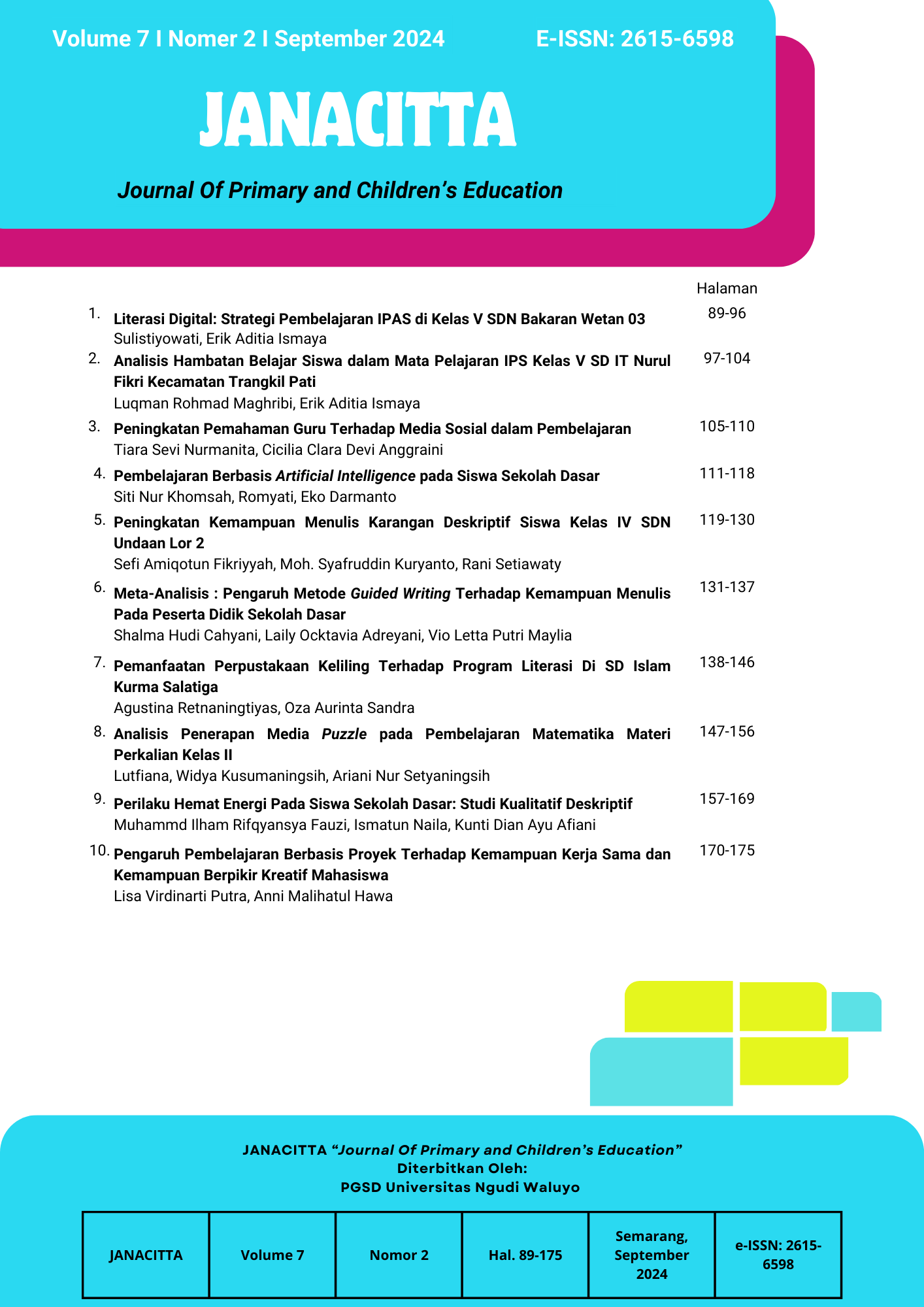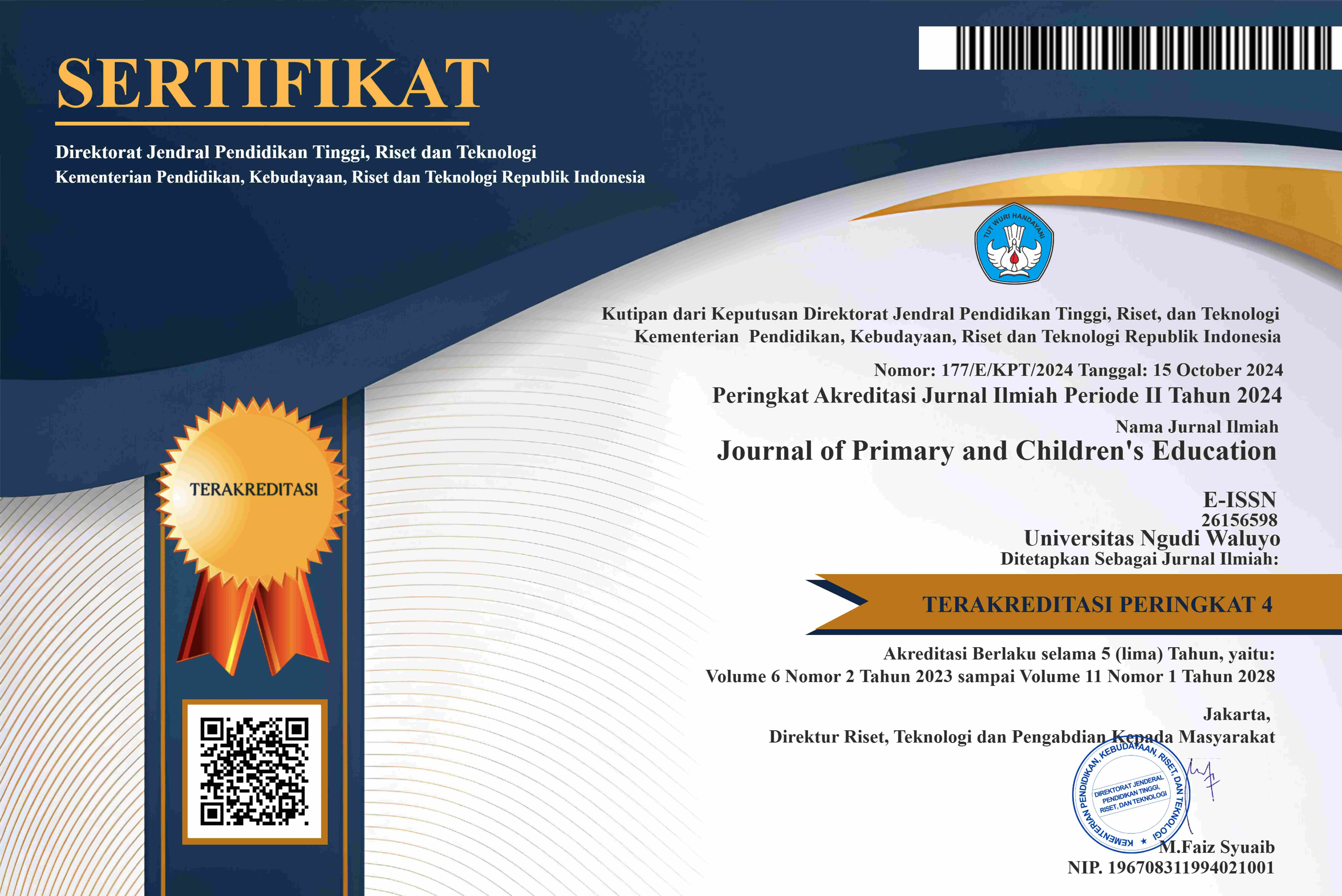Pengaruh Pembelajaran Berbasis Proyek Terhadap Kemampuan Kerjasama dan Kemampuan Berpikir Kreatif Mahasiswa
DOI:
https://doi.org/10.35473/jnctt.v7i2.3463Keywords:
Project-Based Learning, Collaboration Skills, Creative Thinking SkillsAbstract
Abstract
The research aims to determine the influence of project-based learning management on the cooperation and creative thinking abilities of students at Ngudi Waluyo University, Ungaran. The research method uses quasi-experiment, data collection techniques to measure cooperation abilities are by using assessment observation sheets when working on projects and when presenting them, while creative thinking abilities are assessed in the form of pre-tests and post-tests. The research sample was two classes of PGSD students who programmed elementary school geometry and measurement learning courses in 2023-2024, namely class A with 23 students and class B with 24 students. The research results show that the results show that the increase in students' creative thinking abilities from pretest to posttest by 81% (N-Gain=0.81) is categorized as high, as well as students' collaboration abilities being categorized as high. So it is concluded that there is an influence of the project-based learning model on students' collaboration abilities and creative thinking abilities. From the results of this research, it is suggested that further research needs to be carried out to determine the effectiveness of project-based learning on learning outcomes in other aspects.
Abstrak
Penelitian bertujuan untuk mengetahui pengaruh pengelolaan pembelajaran berbasis proyek terhadap kemampuan kerja sama dan kemampuan berpikir kreatif mahasiswa Universitas Ngudi Waluyo Ungaran. Metode penelitian dengan menggunakan quasi eksperiment, teknik pengumpulan data untuk mengukur kemampuan kerja sama adalah dengan menggunakan lembar observasi penilaian pada saat mengerjakan proyek dan pada saat mempresentasikannya, sedangkan pada kemampuan berpikir kreatif adalah dengan penilaian berupa pree test dan post test. Sampel penelitian adalah mahasiswa PGSD yang memprogramkan mata kuliah pembelajaran geometri dan pengukuran SD tahun 2023-2024 adalah sebanyak 23 mahasiswa. Hasil penelitian menunjukkan bahwa peningkatan kemampuan berpikir kreatif siswa dari pre-test hingga post-test dinilai tinggi yaitu sebesar 81% (N gain = 0,81), dan kemampuan kolaborasi siswa juga dinilai tinggi. Maka disimpulkan bahwa terdapat pengaruh model pembelajaran berbasis proyek untuk terhadap kemampuan kerja sama dan kemampuan berpikir kreatif mahasiswa. Dari hasil penelitian ini disarankan agar dilakukan penelitian lebih lanjut untuk mengetahui efektivitas pembelajaran proyek terhadap hasil pembelajaran pada bidang lain.
References
Amanda, N. W. Y., Subagia, I. W., Tika, I. N. (2014). Pengaruh Model Pembelajaran Berbasis Proyek Terhadap Hasil Belajar IPA Ditinjau Dari Self efficaty Siswa. E-Journal Program Pascasarjana Universitas Pendidikan Ganesha Program Studi IPA, Vol 4, No 1.
Banjar, dkk. (2019). Efektivitas Model Project Based Learning Berbantu Mind Map Terhadap Hasil Belajar Siswa Kelas IV. Journal of Primary and Children’s Education Vol 1 No. 2.
Deswika, E., Sasmiati., Risyak, B. (2020). Penggunaan Metode Proyek Terhadap Sikap Kooperatif Pada Usia Dini. Jurnal Fakultas Kejuruan dan Ilmu Pendidikan Universitas Lampung.
Hamdalia Herzon, H., Budijanto, & Hari Utomo, D. (2021). Pengaruh Problem-Based Learning (PBL) terhadap Keterampilan Berpikir Kritis. Jurnal Pendidikan: Teori, Penelitian, Dan Pengembangan, 3(1), 42–46.
Jayanti, I. M. (2018). Implementasi Model Pembelajaran Berbasis Proyek Untuk Meningkatkan Keterampilan Berpikir Kreatif. Oryza Jurnal Pendidikan Biologi, Vol 7 (2), (1-7).
Muslimah, Aisyah (2023). Meningkatkan Kemampuan Berpikir Kritis Siswa Kelas V Pada Pembelajaran IPAS Menggunakan Model Pembelajaran Project Based Learning. Journal of Primary and Children’s Education Vol 6 No. 2.
Patmanthara, S. (2019). Implementasi Model Pembelajaran Berbasis Proyek Untuk Meningkatkan Aktivitas Dan Hasil Belajar Mahasiswa. Tekno, Vol 26 September 2016, (100-107).
Sabandar, J. (2019). Berpikir Reflektif. Makalah. Prodi Pendidikan Matematika Sekolah Pascasarjana UPI.
Setiyawati, I. (2020). Pembelajaran Berbasis Proyek Dengan Memanfaatkan Adobe Flash CS3 Untuk Siswa Sekolah Menengah Kejuruan. Jurnal Apotema, Vol 2 (1), Januari 2020, (41-52).
Sianturi, A., Sipayung, T. N., & Simorangkir, F. M. A. (2020). Pengaruh Model Problem Based Learning (PBL) Terhadap Kemampuan Berpikir Kritis Matematis Siswa SMPN 5 Sumbul. UNION: Jurnal Ilmiah Pendidikan Matematika, 6(1), 29–42. https://doi.org/10.30738/.v6i1.2082.
Suryani, E. (2020). Pengaruh Metode Outdoor Learning Terhadap Keterampilan Berpikir Kreatif dan Hasil Belajar Mata kuliah Morfologi Tumbuhan Ditinjau dari Kemampuan Akademik Awal Mahasiswa Pada Program Studi Pendidikan Biologi STKIP Bima Tahun Akademik 2013/2014. Thesis. Program Studi Magister Pendidikan IPA Program Pascasarjana Universitas Mataram.
Syamsul, T (2021). Psikologi Pendidikan Berbasis Analisis Empiris Aplikatif. Jakarta: Kencana.
Wibisono, S., Gusniarti, U., Nurtjahjo, E. F. (2021). Pembelajaran Kooperatif Sebagai Upaya Meningkatkan Motivasi Empati dan Perilaku Bekerja sama. SCHEMA-Journal.
Yarmalinda, D., Aldina, E. A., Sufi, D. (2017). Penerapan Model Discovery Untuk Meningkatkan Hasil Belajar Kognitif dan Kemampuan Berpikir Kreatif Siswa Pada Pembelajaran Biologi Kelas X MIA 2 SMA Negeri 1 Pabelan Tahun Pelajaran 2016/2017. Prosiding Seminar Nasional Pendidikan Sains (pp B51- B59). Surabaya. Indonesia: PPS Pendidikan Sains Pascasarjana UNESA.
Downloads
Published
How to Cite
Issue
Section
License
Copyright notice:
- Authors retain copyright and grant the journal right of first publication with the work simultaneously licensed under Creative Commons Attribution License that allows others to share the work with an acknowledgement of the work's authorship and initial publication in this journal.
- Authors are able to enter into separate, additional contractual arrangements for the non-exclusive distribution of the journal's published version of the work (e.g., post it to an institutional repository or publish it in a book), with an acknowledgement of its initial publication in this journal.
- Authors are permitted and encouraged to post their work online (e.g., in institutional repositories or on their website) prior to and during the submission process, as it can lead to productive exchanges, as well as earlier and greater citation of published work (The Effect of Open Access)







